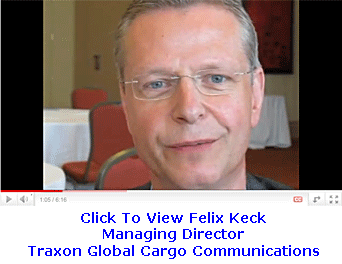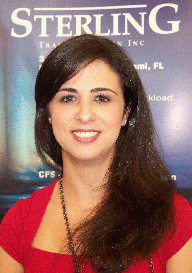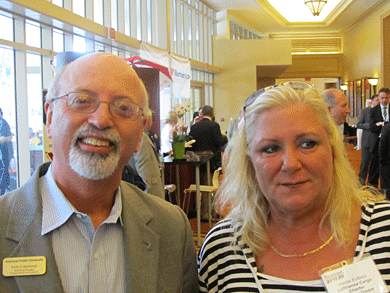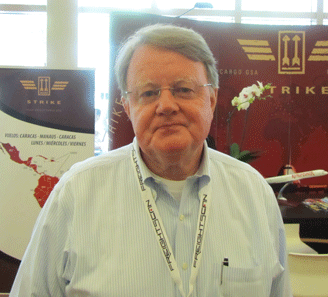CNS
2010 In Depth
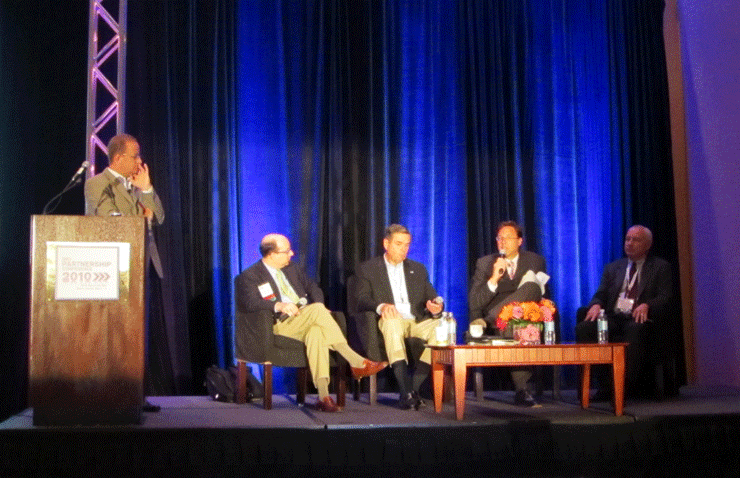
 As
the 20th Annual IATA Cargo Network Services (CNS Partnership) continued
at the Miami Doral Golf Resort earlier this week, Air Cargo News/Flying
Typers sent our contributing editor, Ted Braun, into meetings to get
the news. As
the 20th Annual IATA Cargo Network Services (CNS Partnership) continued
at the Miami Doral Golf Resort earlier this week, Air Cargo News/Flying
Typers sent our contributing editor, Ted Braun, into meetings to get
the news.
Our goal was to generate on-the-minute
reports of IATA CNS meetings – a series of word pictures delivered
to the air cargo industry at large that was unable to attend IATA CNS.
We want to give you a sense of the quality of the CNS presentations
along with the blow-by-blow interactions of participants.
Attendees of the conference ponied up
as much as $1300.00 for the privilege of attendance.
So, dear reader, having put our money
where our convictions are and paid the ticket for this pay-per-view
event, we hope that you will find the following of some use.
Here is Ted Braun’s report:
CNS DAY 1
 After
the opening formalities, keynote speaker Dr. Andreas Otto, (left) Lufthansa
Cargo, got off to an explosive start. The remark that drew everyone’s
attention was his view that a joint airline/forwarder formulation of
industry concerns in political forums was essential to success and sustainability,
and he saw CNS well positioned for such a role. After
the opening formalities, keynote speaker Dr. Andreas Otto, (left) Lufthansa
Cargo, got off to an explosive start. The remark that drew everyone’s
attention was his view that a joint airline/forwarder formulation of
industry concerns in political forums was essential to success and sustainability,
and he saw CNS well positioned for such a role.
He furthermore suggested that the unique
CNS model be applied to other countries. Jo Frigger, Emo Trans, courageously
stated that IATA de facto suppressed CNS-type development worldwide—and
suddenly the elephant in the room was fingered! It couldn’t have
come from a more authoritative source.
CNS President, Michael Vorwerk, responded
diplomatically and essentially squashed any such ideas. The scene was
set in terms of what IATA will and will not do.
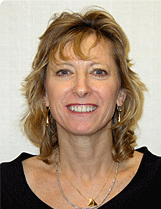 The Industry Analysis session with Helane
Becker (right) of Jesup & Lamont Securities was full of verbal data
without a visual reference, which lessened the impact and import. The
monotonous delivery prompted one participant to retort that they “could
have emailed the report” and “the crowd in the room knows
more about this.” You get the picture.
The Industry Analysis session with Helane
Becker (right) of Jesup & Lamont Securities was full of verbal data
without a visual reference, which lessened the impact and import. The
monotonous delivery prompted one participant to retort that they “could
have emailed the report” and “the crowd in the room knows
more about this.” You get the picture.
It only became more awkward when American
Airlines was unduly singled out for an alleged “bad history of
mergers” and then another foot went into the mouth; oh, but this
speaker had so many feet! And soon we were shoulder deep… a little
preview by the organizers could have saved everyone some embarrassment.
The Risk Management: Securing the Supply
Chain went smoothly and brought a little flavor to our collective palates
on how things look and work in Washington.
Immediately following lunch, the Air Forwarders
Association’s Brandon Fried delivered a lively and well-gauged
‘State of the Industry’ forwarders’ perspective.
The key points examined the issues of
the day, in which forecasting is key, as well as demand minus capacity
triggers and the impact of screening on air freight, all of which contribute
to rates rising. Brandon stated that profit was a clear issue for forwarders,
but apparently not necessarily for airlines.
 Doug Brittin, (left) recently named as
general manager cargo at TSA replacing Ed Kelly who died in December
2009 was next, delivering an overview of the August deadline for screening
100% of cargo flown on passenger aircraft and its components –
a tally consisting of 186 ICSF (independent cargo screening facilities),
55 shipper screening facilities and 409 IAC (indirect air carriers).
The figures did the job of emphasizing that 94 percent of U.S. exports
via wide-body aircraft are channeled through 18 major gateway airports,
where capacity is reaching its physical limits. This is where delays,
backlogs and problems can be anticipated given the piece-level screening
requirement. Self-interest has been the driving force for shippers of
perishables, pharmaceuticals, museums and funeral homes in terms of
undertaking their own screenings.
Doug Brittin, (left) recently named as
general manager cargo at TSA replacing Ed Kelly who died in December
2009 was next, delivering an overview of the August deadline for screening
100% of cargo flown on passenger aircraft and its components –
a tally consisting of 186 ICSF (independent cargo screening facilities),
55 shipper screening facilities and 409 IAC (indirect air carriers).
The figures did the job of emphasizing that 94 percent of U.S. exports
via wide-body aircraft are channeled through 18 major gateway airports,
where capacity is reaching its physical limits. This is where delays,
backlogs and problems can be anticipated given the piece-level screening
requirement. Self-interest has been the driving force for shippers of
perishables, pharmaceuticals, museums and funeral homes in terms of
undertaking their own screenings.
The next milestones after August 2010
are U.S. inbound cargo – a staggering 3.1 billion pounds flown
annually on passenger aircraft from 97 countries! Government-to-government
liaison has been the main vehicle the U.S. employs to push this through
worldwide. A question from the floor indicated that forwarders had only
found out about this new timeline in late April and inquired whether
outreach to major global airports had been contemplated.
The government works mainly through its
agencies and the speaker encouraged the industry to be proactive in
communications in this matter. It goes without saying that this is another
unfunded mandate.
The airline panel had a well-qualified
and diverse geographic, as well as representation for passenger and
freighter aircraft operators. It began promisingly enough with each
executive outlining his or her management of the 2009 annus horribilis
challenges. It quickly became clear that each airline and market was
different, and the moderator started losing the room. The question hovering
in the air was whether there was a real lesson for the audience and
industry in general in all of this, let alone in the purpose of drilling
the panel further, which the panelists valiantly carried on obligingly.
Common threads revolved around capacity
management, matching supply and demand, financial management and the
uncertainty of going forward with persistent volatility and unreliable
indicators. Concerns were expressed regarding possible reactions by
shippers to remodel their global supply chains to fend against capacity
and price swings, which were deemed unacceptable.
All this discussion around pricing had
me wondering whether there was an IATA lawyer anywhere nearby that could
redirect the conversation.
In my view, while each panelist demonstrated
clear command of the issues, I left feeling uncertain as to the point
of analyzing 2009 when, as it was stated, 2010 and 2011 will be different,
and while it was interesting, I couldn’t figure out how it contributed
to the CNS mission and the paying audience.
On to day two!
CNS DAY 2—Part I
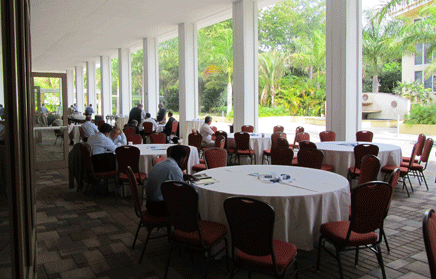 Tuesday
morning’s “Time & Temperature Logistics for Healthcare
Products” caught my attention as it represented the sole dependable
revenue generator in tough times. I quickly found out I had a lot to
learn – this session was for the cognoscenti! Loaded with technical
abbreviations and pharmaceutical-related techno-speak, it revealed the
tremendous growth of this product line and the work of IATA’s
Time & Temperature Task Force (TTTF), now a permanent body under
its Live Animals and Perishables Board. The resulting regulations are
contained in Chapter 17, Air Transport Logistics for Temperature-Sensitive
Healthcare Products, which has been developed by a multidisciplinary
Pharmaceutical Technical Working Group. The panelists remarked that
they had been surprised about how little the airline and pharmaceutical
industries knew about each other. Tuesday
morning’s “Time & Temperature Logistics for Healthcare
Products” caught my attention as it represented the sole dependable
revenue generator in tough times. I quickly found out I had a lot to
learn – this session was for the cognoscenti! Loaded with technical
abbreviations and pharmaceutical-related techno-speak, it revealed the
tremendous growth of this product line and the work of IATA’s
Time & Temperature Task Force (TTTF), now a permanent body under
its Live Animals and Perishables Board. The resulting regulations are
contained in Chapter 17, Air Transport Logistics for Temperature-Sensitive
Healthcare Products, which has been developed by a multidisciplinary
Pharmaceutical Technical Working Group. The panelists remarked that
they had been surprised about how little the airline and pharmaceutical
industries knew about each other.
Group members (and now TTTF members) include pharmaceutical industry
companies, forwarders, airlines and temperature-controlled container
manufacturers. A new 4X4 inch handling label has been developed that
would be affixed by the shipper and is intended to signal to handlers
the need to maintain such packages at between 15°C and 25°C
ambient temperature (this applies to the package itself and not the
contents). The use of the label is not mandatory.
For a task force, it has its own support
group consisting of an advisory board and a care team, both staffed
by cross industry experts. This line of business has been growing steadily
and currently there are 25 or more airlines offering distinct Chapter
17 compliant products and services. This focus and IATA’s responsiveness
can only be understood when one looks at the numbers. But, there is
one small problem – copies of the presentations were not made
available. The presenter of the most compelling data refused flat-out
to provide it. Perhaps the presentations will be offered for sale separately!
This may be a digression, but when, as
a member of the media, a company is restricted arbitrarily to a certain
number of participants at this CNS conference, and therefore after having
paid the full registration fee, one should be afforded the equivalent
of the pilots’ MEL (minimum equipment list) for such a commercial
event and its sessions. In my view, this package ought to include:
•
Copies of the material presented; unless it is communicated upfront,
it will not be available
•
Opportunity and time for questions and answers
•
Some presence and representation of the organizers (CNS/IATA),
not the Worldtek proxies
•
Structured, consistent, professional session management
Back to those numbers though. The secretive
panelist’s confidential slides did put things into vivid context
– I did mention the details weren’t being made public, right?
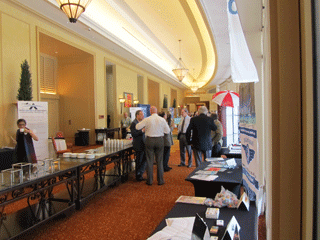 Going
by my notes, pharmaceutical logistics allegedly represent 3.7% of the
global market, or 1 billion dollars projected in 2010. Of that, 19%
were temperature sensitive. The significant tidbit was the correlation
between product price and temperature sensitivity, with a single unit
up to $5,000 to $7,000 apiece; a full ULD would potentially have a value
in excess of 30 million dollars. Going
by my notes, pharmaceutical logistics allegedly represent 3.7% of the
global market, or 1 billion dollars projected in 2010. Of that, 19%
were temperature sensitive. The significant tidbit was the correlation
between product price and temperature sensitivity, with a single unit
up to $5,000 to $7,000 apiece; a full ULD would potentially have a value
in excess of 30 million dollars.
It is no surprise that risk management
is the name of the game! The order of magnitude can be easily illustrated
and quickly understood with statistics indicating 5% of pharmaceutical
sales are scrap, of which 30% can be attributed to logistics. But you
have to promise not to tell anyone!
Nina Heinz of LifeConEx highlighted its
audit business, which regularly makes site visits to 40 or more airports
worldwide. It goes without saying that these products are governed by
strict SLA (service level agreement) among the participants, be it airlines,
forwarders or 3 and 4PLs. The talk pointed out the wide variety of findings
by geography, sophistication and effectiveness, and not necessarily
where one would expect it. One remark
stood out for me – to quote: “In-flight cargo hold temperatures
are still a big unknown." Again, when dedicated temperature controlled
ULDs are utilized, I don’t see the problem; the rest depends on
the type of aircraft and age. I also have a suggestion – contact
IATA Airline & Aircraft Operations, Engineering & Maintenance.
Somebody there surely can provide a definitive answer… and yes,
I know that is a different area of activity.
As an aside – the LifeConEx home
page states – quote: “…supply chain neutral (airlines,
forwarders, truckers, packaging, technology, etc.).” The operative
word is “neutral.”
If you are not convinced, look up ‘LifeConEX.’
Shareholders are listed as 50% Lufthansa Cargo and 50% DHL Global Forwarding.
The board of directors boasts four executives, including Dr. Andreas
Otto, a member of the executive board of Lufthansa Cargo and Klaus Holler,
Vice President Lufthansa Cargo, Americas. Nothing untoward, just why
call it ‘neutral’?
One suggestion by the panel was for IATA
to help coordinate onsite airport audits by developing a standardized
audit form, something being worked on by the UK-based ‘Pharma360°’
with potential inclusion in Chapter 17. But there was no one from IATA
there, as a result there was no one who might have run it up the flagpole,
so at CNS 2011 there could be something in play, if a way is found to
generate some revenue from it.
Air Canada’s panelist elaborated
on the evolution and development of AC Cool, a good example of what
can be done when there is focus and resources devoted to an issue. And
the session ran out of time before any Q&A could take place. The
panel stayed on a few minutes for one-on-one. All in all a very insightful,
workman-like track about a topic which is surely gaining prominence,
not in the least because of the dollar amounts involved on all sides.
Kevin O’Donnell, Moderator suggested
Air Cargo News Flying Typers ought to cover the next TTTF meeting;
and we would, as long as IATA makes it possible for media to attend
without charging, yet again, a fee for making industry work public.
We have accepted the invitation in principle and wait to hear from Des
Vertannes!
CNS Day 2 – Part II
If you are one of the long time loyal
readers of Air Cargo News Flying Typers, and we know you are,
you might wonder what got us into covering sessions at an industry event.
Well, Geoffrey remembered that for years we had been bitching about
the rather consistently poor quality of the meetings and sessions at
CNS, ACA, TIACA, etc. In the past the extent of the “session work”
was attendance at a couple of meetings, interviewing attendees, and
getting some feedback. This year we wanted to get the real story! And
Air Cargo News/Flying Typers was made to pay full registration
fees for the privilege.
As a relatively new presence at CNS, the
“Commodity or Integral Part of the Value Chain” track with
emphasis on ground handling seemed worth exploring. Well-known individuals
as panelists promised an interesting session.
Halfway through it, I was transported
back in time 15 years or so, when forwarders and airlines at CNS were
standing up and angrily throwing mutual accusations, stabbing the air
with a pointing finger to demonstrate their woes to the other side.
Except this time, it’s a broken dialogue conducted by the ground
handlers versus the world! Not that there aren’t enough real challenges
and looming deadlines around the corner to make even the strongest knees
shake under the table.
As the global trend is to refocus on its
core business, over the years airlines have outsourced many activities,
from maintenance to sales and ground handling. At the beginning of time
– circa 1970 – the foundation for ‘handling’
was one airline handling another airline’s operation, so it’s
no surprise that the foundation of such agreements reflect that particular
aspect. Now those services are provided by ground handling companies,
and, although touched up, the agreements are considered archaic. Much
time, effort and cost goes into SLA (service level agreement), which
is needed to govern the complex interdependencies among shippers, freight
forwarders, airlines, and ground handlers.
With airline self-handling pretty much
a thing of the past and ground handling evolving into a global business,
a lot has been happening, much of it behind the scenes. What partially
sharpened the minds has been the security burdens brought to bear in
the form of cargo screening on passenger aircraft. The background of
it is well known – unfunded laws enforced by the government leave
the supply chain participants with few uncomfortable choices, which
cost many millions of dollars in the middle of a global economic crisis
of unprecedented proportions.
 With
an excellent moderator, this panel was a subdued and clearly unhappy
crowd, with doom and gloom hanging heavily in the air with everyone
anticipating August 1 as if it were Armageddon. John Batten (left) of
Swissport was the sole standout, consistently putting a positive spin
on his company’s efforts to do the best possible job to provide
good service and add value wherever and whenever possible. With
an excellent moderator, this panel was a subdued and clearly unhappy
crowd, with doom and gloom hanging heavily in the air with everyone
anticipating August 1 as if it were Armageddon. John Batten (left) of
Swissport was the sole standout, consistently putting a positive spin
on his company’s efforts to do the best possible job to provide
good service and add value wherever and whenever possible.
Perhaps relatively few insiders still
marvel, as I frequently do, at the unheralded triumph of getting a flight
in the air. It takes so much to make this happen, despite all odds,
with little fanfare and unglamorous hard work, under relentless pressure
in the bowels of airport terminals and on icy ramps! Yet, it’s
a business and the vendors get paid for it. A phrase during the session
stuck in my mind–“the ephemeral notion of quality”
which brings you right back to the ground and what this is about.
The panelists and the moderator went over
all the pain and suffering and most of the issues and concerns faced
by the ground handlers and their airline customers, with the recurring
theme being revenue and costs. Clearly, the economic downturn put even
more severe strains on the parties, with previously essential tenets
such as certification (ISO for example) no longer being required; in
other words, find a way to provide the service for as little as possible.
As a business, ground handlers invested in standards and quality, which
matter very little when airlines, forwarders and their respective shippers
can’t or won’t pay for it. Therefore, ground handling as
a commodity is the sin qua non of “show me some love” in
the big scheme of partnership, in this case one which has taking some
big hits over the last 3 years.
Against the backdrop of a 3-year term
for a ground handling agreement and 60 days out clause, the ground handlers
are feeling squeezed having invested in equipment, including cargo screening,
which results in disadvantageous ROI. SLA-based or add-on bonus-malus
clauses (a negative bonus for poor performance) are generally resented
and do not seem to contribute to cooperative solutions, but what business
is without a horde of lawyers behind it?
Ground handling has made its way into
Cargo 2000, albeit without board representation. Similar to the other
session I attended, there was no CNS or IATA representative present,
so this is in the ‘wish list’ category. More complaints
were expressed regarding cargo screening and TSA’s exclusion of
ground handlers from discussions and consideration in the procedure
development process, given the impact on their role and activities.
To be fair, it’s important to remember that ultimately it is always
the airlines whose feet are held to the fire by the regulators and they
chose to divest themselves of control in this critical area, which,
admittedly, has long been the weakest link in the chain and is likely
to remain so for the foreseeable future.
Equitable partnerships are a good thing
in and by themselves. In the airline cargo business this implies authority
and responsibility commensurate with each partner’s investment.
This is an uncomfortable idea, because airlines invest by far more in
this capital-intensive business with as example just the cost of aircraft
alone, not to mention fuel. Freight forwarders pride themselves at bringing
the business. While that may be very true, their capital exposure pales
in comparison. Despite this, they have been very vocal in demanding
their share and making profits. And now the ground handlers, somewhere
in between in terms of investment in equipment and infrastructure and
being the last line of defense in the physical cargo process, also need
to turn a profit. Squeezing one another is a recipe for disaster and
the signs of positive change just aren’t there.
The moderator of this session wrapped
up, promising to take some action points to follow up with CNS, i.e.
IATA. We will continue to watch carefully and attentively and ask again
and again for substantive proof that IATA can deliver.
Ted Braun/Flossie
|


